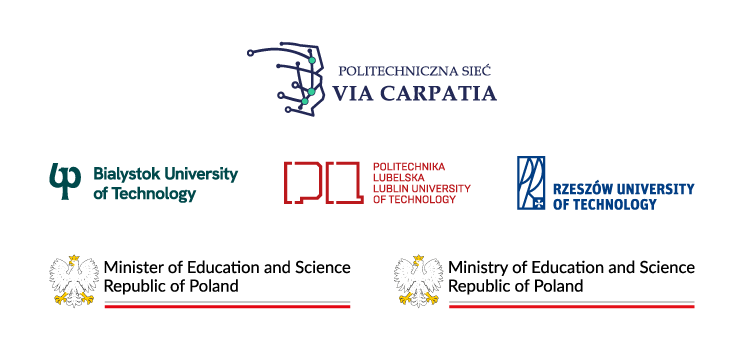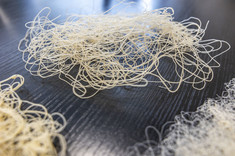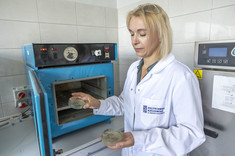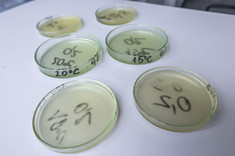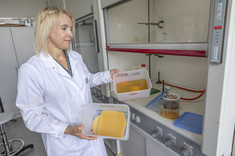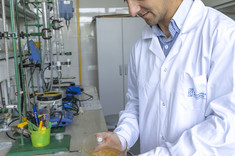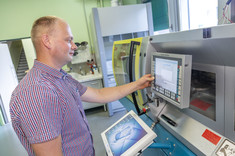Studies of the influence of modifications of biodegradable aliphatic polyesters on the processing and functional properties of innovative polymer compositions
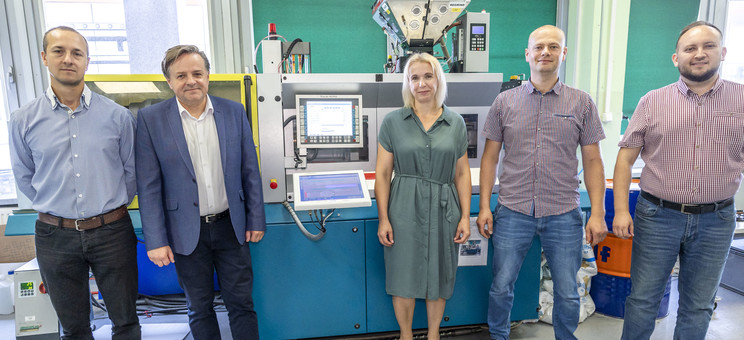
Project is performed within the VIA CARPATIA Polytechnic Network ointhe name of the President of the Republic of Poland Lech Kaczyński. The project manager is Iwona Zarzyka, BEng, PhD, DSc, Assoc. Prof.Tit. from the Department of Organic Chemistry at the Faculty of Chemistry of the Rzeszów University of Technology. The research project is carried out by a cooperation of three research groups: research team from the Białystok University of Technology, the Lublin University of Technology and the Rzeszów University of Technology. The project leader is the Rzeszów University of Technology.
Research team
Bialystok Technical University: Principal Investigator: Michał Kuciej, BEng, PhD, DSc, ProfTit., Research team members: Adam Tomczyk, BEng, PhD, Anna Falkowska, BEng, PhD
Lublin University of Technology: Principal Investigator: Tomasz Klepka, BEng, PhD, DSc, Assoc. Prof., Research team members: Monika Ostapiuk, BEng, PhD, Aneta Tor-Świątek, BEng, PhD, Magda Droździel-Jurkiewicz, BEng, MSc
Rzeszow University of Technology: Principal Investigator: Iwona Zarzyka, BEng, PhD, DSc, Assoc. Prof.Tit., Research team members: Karol Hęclik, BEng, PhD, Wiesław Frącz, BEng, PhD, DSc, Assoc. Prof., Grzegorz Janowski, BEng, PhD, Łukasz Bąk, BEng, PhD
Project description
The aim of the project is to produce polymer compositions based on poly(3-hydroxybutyric acid), P3HB, which exhibits significantly longer degradation times compared to other polymers in the poly(hydroxyalkanoate) group. P3HB is a UV-resistant biodegradable polymer produced by bacteria. At the same time, it is insoluble in water and relatively resistant to hydrolysis, which distinguishes it from other biodegradable polymers that are either water-soluble or moisture-sensitive. The disadvantages of P3HB, such as stiffness and brittleness, and above all its low thermal stability, only slightly higher than its melting point, limit the commercial use of P3HB. The thermal instability of this polymer during processing makes it difficult to replace commercial non-biodegradable polymers with pure P3HB due to the narrow window of processing conditions.
An improvement in the thermal, processing and mechanical properties of P3HB will be achieved by an original method developed by a team from the Rzeszów University of Technology consisting in the reduction of the degree of crystallinity by plasticisation of P3HB and its copolymers with, among others, 3-hydroxy valeric acid and 3-hydroxyhexanoic acid using linear polyurethanes with aromatic rings. The use of a polyurethane modifier will result in modern P3HB-based material compositions with improved properties that are also biodegradable. In addition, P3HB-based polymer compositions with thermoplastic properties will still be highly biocompatible like unmodified P3HB and will not show cytotoxicity and mutagenicity, increasing the range of application possibilities. Thanks to these unique properties, the new flexible polymer compositions will find application, among others, in biodegradable packaging materials, as well as in construction and horticulture in the form of non-woven and agro-textile fabrics.
The subject of the project is to obtain and scientifically study the properties of novel polymer compositions based on a matrix of poly(3-hydroxybutyric acid) (P3HB) and its copolymers with 3-hydroxyvaleric acid (PHBV) and 3-hydroxyhexanoic acid (PHBHHx) and a modifier - linear polyurethane with aromatic rings. The use of the polyurethane modifier will not only allow the desired modification of the thermal and mechanical properties of P3HB and its copolymers, but will also accelerate its biodegradation, as the addition of hydrophilic polymers increases the absorption of water into the polymer mass and accelerates its hydrolysis.
The project is being carried out by a research team from the Faculty of Mechanical Engineering at the Lublin University of Technology, the Faculty of Mechanical Engineering at the Bialystok University of Technology, and the Faculty of Chemistry and Faculty of Mechanical Engineering and Aeronautics at the Rzeszów University of Technology. The project’s scientific team is made up of specialists in the synthesis of materials for novel polymer compositions, technologists in the area of materials processing, especially polymers, and scientists in the field of material and strength research, undertaking studies recognised in Poland and worldwide as a priority. At the same time, it is noteworthy that the development of young scientists in individual scientific units is supported by their participation in the proposed research project. The strength of the team is determined by its scientific potential - the knowledge and skills of the scientists who comprise it, and its modern research infrastructure.
The project is interdisciplinary and involves the implementation of tasks within the field of engineering sciences in the disciplines of chemical engineering, materials engineering and mechanical engineering. The project concerns the problem of synthesis, structure formation and processing and application properties of novel biodegradable polymer compositions in solid and fibre form. The interest in the subject of the research project results from the demand for technology for modern innovative materials and novel pro-ecological technologies, which, apart from their high research and scientific potential, are also of application significance.
Within the discipline of chemical engineering, a new method will be developed for the preparation of linear polyurethanes with aromatic rings of a specific molar mass with different polyol components. The results obtained will introduce a body of new information in the field of polyurethane synthesis. The optimised method for the synthesis of linear polyurethanes based on diphenylmethane 4,4’-diisocyanate and polyethylene glycols will be the basis for the development of industrial-scale production technology.
Within the scope of materials engineering discipline, novel, biodegradable polymer compositions will be produced by direct mixing using a plasticising system in the extrusion and injection moulding processes. It is planned to use the developed polymer compositions to produce solid extrudates in the form of tapes and thin-walled films, injection moulded parts and products with an original spatial structure using the melt blowing method to produce agro-textiles from polymer fibres. The new materials will be tested using modern testing techniques and tools, including a digital tomograph, for homogeneity, internal structure, thermal properties and thermal stability.
A modern unique processing and research tool will be made and tested within the mechanical engineering discipline – a head for a relatively little-known process of non-woven fabric production by the melt-blown method. The basic wear and tear characteristics of newly obtained products made of biodegradable compositions will also be determined, taking into account the influence of various types of matrix and different modifiers on the above-mentioned characteristics.
The results of the planned research will allow to confirm that the original novel material compositions are a better alternative to the currently used materials. The results of the research covered by the project will make a significant contribution to the development of basic sciences, including chemical engineering, materials engineering and mechanical engineering, in terms of a comprehensive and systematic description of the synthesis of polymeric materials with desirable strength properties, biodegradability and appropriate durability, and the development of technologies for biodegradable polymer compositions with a high degree of innovation. This could be of great importance for producers and users of polymeric materials in the design, manufacturing and operation phases, both of solid and fibre products produced by injection moulding and extrusion, but also by melt blown methods.
Anticipated applications of the new materials in addition to solid products will include exploring the possibility of producing a biodegradable agro-textile. The used agro-textile will release nitrogen into the soil during biodegradation and thus act as a fertiliser. Due to its nitrogen content, which is comparable to that of natural fertilisers, the dual-functionality of the new agro-textile will be its added value.
Scientific problems undertaken within the framework of the proposed project significantly expand the knowledge of the entire team in the field of basic sciences and provide support for work of a technological nature conducted in parallel for implementation purposes. The cooperation established within the project will allow the level of technological readiness of the developed solutions to be increased in a shorter time and will result in a faster path to commercialisation of the results, which undoubtedly fits in with the global assumptions of the VIA CARPATIA project, precisely with the assumptions of the 3rd pillar, which is commercialisation. Cooperation, sharing knowledge and skills creates a synergy effect, giving a greater range of research opportunities and obtaining fur-ther joint projects, both research (NCBiR, NCN, EU Framework Programmes) and application (PARP, LAWP, PCI), and the development of joint scientific publications and patents, which is the most important challenge of the cooperation programme.
It is planned to collaborate with local companies to commercialize the research results and market the improved product through process and product innovation.
